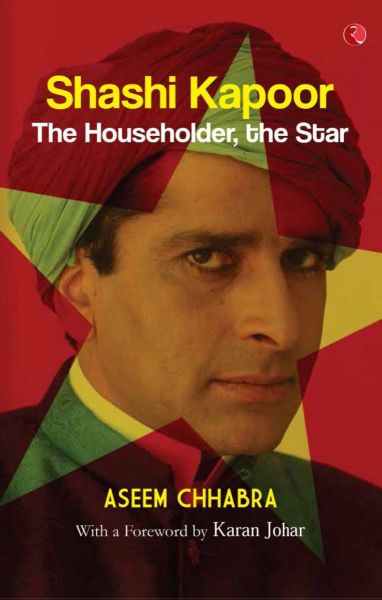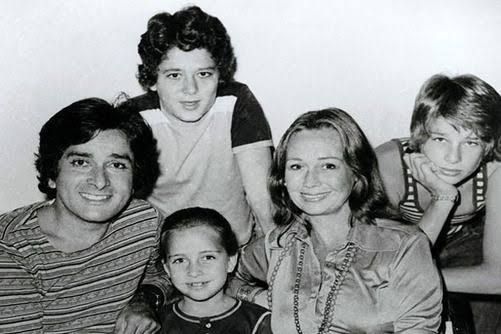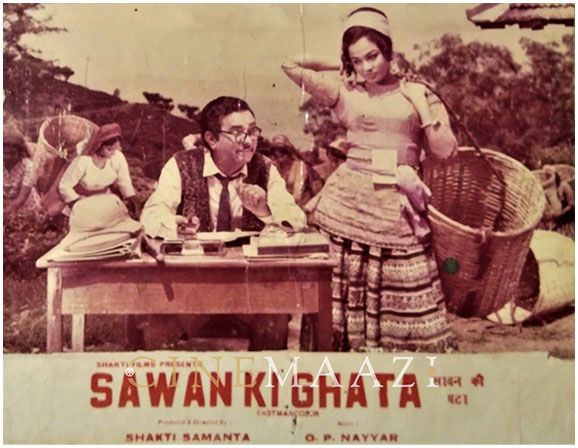Shashi Kapoor: Away from the Spotlight
India’s first biography of Shashi Kapoor sheds light on one of the country’s most enigmatic personalities—an actor who straddles the worlds of commercial Hindi cinema, theatre and small-budget art movies; who is, at once, an earnest householder and a committed star.
In this rare book, we are offered glimpses of Shashi Kapoor, the family man—son of Prithviraj Kapoor, husband of Jennifer Kendal, and father to Kunal, Karan and Sanjna. We are led through Shashi Kapoor’s film career—his debut as a bright-eyed child-actor in Awara; his emergence, in the hectic 1970s, as India’s busiest performer—with a slew of hits including Deewaar and Trishul; and his rise to international prominence with Merchant–Ivory’s The Householder and a ‘trilogy’ of films on older men with fading pasts. Equally, we are provided with an astute analysis of Shashi Kapoor, the businessman—the proprietor of Film-Valas; the producer of Shyam Benegal films; and the distributor of Bobby.
With luminous and thus-far undisclosed stories by the actor’s family (Neetu Singh, Rishi, Sanjna and Kunal Kapoor), co-stars (Shabana Azmi, Simi Garewal, Sharmila Tagore), colleagues (Shyam Benegal, Govind Nihalani, James Ivory, Hanif Kureishi, Aparna Sen), and friends; a compelling foreword by Karan Johar; and stunning photographs from Merchant–Ivory’s archives, Shashi Kapoor, the biography—by one of India’s best-known film journalists—is as captivating as Shashi Kapoor, the star.
The following is an excerpt from Aseem Chhabra's Shashi Kapoor: The Householder, The Star.
‘Shashi once told me that when he got married to Jennifer, his room was a thoroughfare—he never really had any kind of privacy,' Sharmila Tagore says, recollecting the modest life of the man who would become a star. 'Fortunately, he had grown up with that kind of sharing and tolerance, in an atmosphere that demanded improvisation. It was part of him.'
'Shashi, his wife and kids later moved to Altamount Road and eventually to Napean Sea Road in South Bombay, where Jennifer made every effort to give her children a normal life away from the glamour and over-the-top madness of the Hindi film industry. For one, the family had no television. When Sikandar, which starred Prithviraj Kapoor, was broadcast, the family had to rent a TV set for a day. 'I must have been three, but I remember looking at the screen and saying, "Papa",' Sanjna says. 'Because my grandfather looked very much like my dad. I remember that very well.'
Lastly, the children were taught to navigate the city like so many others. 'We travelled by BEST (Brihanmumbai Electric Supply and Transport) buses and local trains. It was something we grew to value—being normal people, almost anonymous,' Sanjna says. She also has strong memories of her mother dragging her to Bombay's chaotic Chor Bazaar: 'For me it was the greatest torture to be hauled there after school because my mother had to buy something—and it would never just be one thing. It would go on for four or five hours! But I also loved it because it was the one place in India where I was not Shashi Kapoor's daughter; I was Jennifer Kendal Kapoor's child. Besides, my mother would always bribe me with dosas, idlis and vadas at an Udupi restaurant opposite Crawford Market!'
In spite of Jennifer's unsentimental approach to fame, it can't be denied that the family had to fine-tune its life to accommodate Shashi's celebrity-dom. Sanjna says, 'I have never walked the streets of Bombay with my father in my entire life. That was impossible and I was completely aware of it.' Kunal, on his part, remembers rare early morning family visits to the zoo. We would have to get there before the zoo opened, and secure permission to visit half--an-hour before the crowds would descend. Towards the end of our appointment, fans would gather and start recognizing Dad.'
“I think the greatest gift my parents ever gave us was the home in Goa before Goa became what it is now,' Sanjna says. “I am sure my brothers will agree. We were normal, we were regular. The villagers tested us for more than a year until they accepted us. They didn't know who my father was.' She adds that Goa, at that time, had only a couple of movie theatres, and the local inhabitants—most of them Konkani fishermen—hardly watched Hindi films. 'Of course, they did eventually understand who Papa was. But then, they didn't care!'

This has been reproduced from the book Shashi Kapoor: The Householder, The Star.
The banner image did not appear with the original publication and may not be reproduced without permission.
Tags
About the Author
Aseem Chhabra is a film journalist, freelance writer and film-festival programmer in New York City. He has been published in The New York Times, The Boston Globe, The Philadelphia Inquirer, Outlook, Mumbai Mirror, Rediff.com, has a regular colum in The Hindu; and has been a commentator on Indian cinema adn popular culture on NPR, CNN, BBC, as also ABC's Good Morning America, Associated Press and Reuters. Aseem is the festival director of the New York Indian Film Festival and the Silk Screen Asian American Film Festival in Pittsburgh. He is also the voice of Shadow Puppet #1 in director Nina Paley's award-winning animated film, Sita Sings the Blues.
Aseem is from Delhi, lives in New York, and visits India often. Ge can be followed on Twitter @chhabs.








.jpg)


